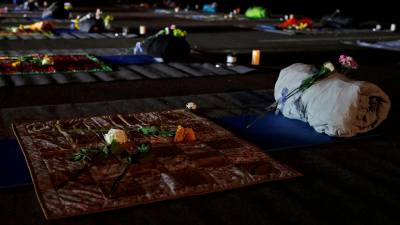CHICAGO: A group of more than 100 survivors and families of victims killed in the 2023 mass shooting in Lewiston, Maine, sued the U.S. government over claims it failed to respond to repeated warning signs that the shooter, an Army reservist, could become violent. The lawsuit, filed in federal court in Portland, Maine, on Wednesday, claims the U.S. Army, the U.S. Department of Defense, and a New York Army hospital were negligent in their handling of Army Reserve Sergeant Robert Card, who had exhibited signs of severe mental illness for more than a year before the shooting and made explicit threats to carry out mass violence.
The October 25, 2023, shooting killed 18 people and wounded 13 at a bowling alley and a restaurant. Card was found dead of a self-inflicted gunshot wound two days later.
The lawsuit claims that by March 2023, the U.S. Army knew Card, a 20-year veteran of the U.S. Army Reserve and a West Point firearm and grenade instructor, was paranoid, delusional, and violent, and that he had a hit list and access to firearms. But the Army did not remove Card’s guns, dissuaded law enforcement from taking the guns, and dismissed Card’s threats to “shoot up” a Maine Army Reserve center in the month before the massacre, the victims say in the lawsuit. In a statement, Army spokesperson Lieutenant Colonel Ruth Castro said the Army does not comment on pending litigation. A Department of Defense spokesperson also declined to comment on pending litigation, and representatives for Tricare, the military’s healthcare agency, did not respond to a request for comment.
Cynthia Young, whose husband William and 14-year-old son, Aaron, were both killed at the bowling alley, is among those suing.
In a statement, she said, “We trusted those in power to protect our loved ones, and their inaction cost us everything.”
The lawsuit seeks monetary damages for pain and suffering, medical and funeral expenses, emotional distress, and more. Attorney Ben Gideon said at a press conference that it was too early to say how much the plaintiffs would seek.
The lawsuit claims Army researchers have recognized a connection between service members exposed to repeated explosions, like Card, and increased rates of anxiety, paranoid thinking, and aggressive behavior.
Citing other mass shootings committed by veterans and service members, the lawsuit claims the U.S. Army has developed a detailed procedure for dealing with service members whose mental health may make them a threat to themselves or others, but did not follow it in Card’s case.
In the months before the Lewiston shooting, members of his unit warned their leadership that Card was making threats about mass shootings and had a collection of firearms. Card was sent to Keller Army Community Hospital in West Point, New York, for an involuntary psychiatric evaluation, where providers found he had homicidal ideation and was a threat to others.
Despite the findings, Card was discharged on the condition that the U.S. Army would remove his weapons, attorneys for the victims said. That never happened, and the U.S. Army did not follow up with him to ensure he was following a treatment plan and receiving the help he needed, the lawsuit claims. – Reuters
